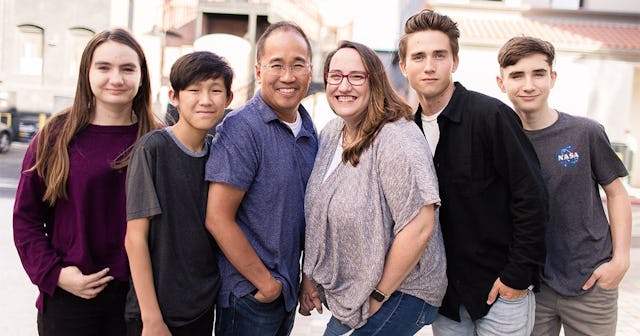I Taught My Teens Something School Never Could

I don’t remember where I first read it. It may have been in the child psychology class I took one semester, or in one of the dozens of parenting books I devoured in the early years of being a mother. But, somewhere early in my parenting journey, I decided it was extremely important for me to help my children name their feelings.
Even before my children could speak in words and sentences, I was naming their emotions for them.
I’d say things like:
“Oh, you’re frustrated right now. It is hard to wait for mommy to get your food ready.”
“You’re so happy right now. You’re laughing so hard.”
“You’re feeling a little scared because you haven’t met that dog before. You want to make sure he is friendly before you try to make friends.”
I did this without really giving it much thought after a while. It was the running monologue of a young mom’s life. I told them what I was doing, thinking and feeling, and I helped them find words to describe the same for themselves.
Courtesy of Leslie McCaddon Mendoza
When my oldest was diagnosed with cancer when he was just three years old, he was pointedly direct with the physicians and nurses about how he felt about what they were doing to him. “When you poke me, that hurts! I don’t like it. I feel upset.” “I’m frustrated because you won’t let me go to the playroom!” “This is my body and I decide what can be done to it and I’ve decided no more medicine.” As you can see, having the words didn’t necessarily mean they had the maturity to understand that having a negative emotion doesn’t mean we always get control avoiding it. Like it or not, that little boy had chemo. And he was very frustrated about it. Noted.
These days I have some pretty amazingly emotionally intelligent teenagers. And, to be honest, this doesn’t always work in my favor. They are extremely articulate about telling me exactly what they are thinking and feeling. It can be hard to hear. But, it does work in their favor because they are aware of their feelings. They can tell the difference between fatigue, apprehension, contentment, excitement, frustration, and probably another 99 distinct emotions.
What I was doing without realizing it was teaching them awareness. Emotional awareness. And as they get older, and we all get wiser, we’ve expanded that emotional awareness to include some thought-awareness as well.
My kids are learning, along with me, that those emotions they can name — although nothing to be afraid of or to avoid — are one hundred percent caused by their own thoughts. What they think about someone else’s behavior, their current tasks at hand, and any other circumstance in their life, determines what they will feel.
It would be easy to blame every difficulty in their life on the fact that their dad died by suicide when they were ten, eight, and six. In some cases, teachers and friends even offer up thoughts like, “You deserve a break, you’ve been through so much.” Or even, “People never really recover from something like you’ve been through.” These thoughts, when we take them on (me or the kids) create feelings of helplessness, hopelessness, and even despair. Those emotions aren’t bad or wrong. But, they also aren’t very useful to us!
In our home, we are learning to not only name our feelings but to call out the thoughts we’re having that are creating those feelings. And, when we’re ready, we question those thoughts. We ask, are they helping us or hurting us?
Courtesy of Leslie McCaddon Mendoza
We can list a dozen thoughts that aren’t useful. But, we can also play around with thoughts that create useful feelings like determination, love, hope, and even joy. My kids have innate BS detectors. So, we don’t try any “positive thinking” around here. But, we do try to find thoughts that we believe are true to hold on to.
Thoughts like:
“We were lucky to have a man in our life who loved us so well, even if just for a little while.”
“Grief has taught us a lot about empathy and resiliency. We are more equipped than most to help others through difficult times.”
“It is okay to feel sad sometimes because it is just me feeling love for my Dad and missing him. But, sadness doesn’t define me. It is just one of many emotions I experience in any given day or year.”
“I have all the support available I could possibly need to work through difficult times with my grief.”
When I started teaching my children emotional intelligence 18 years ago, I had no idea what their little lives had in store for them. Like most mothers, I hoped their childhoods would be care-free and wonderful. Instead, their childhoods have presented challenges many adults have yet to face.
I won’t say I wouldn’t change a thing about my parenting choices through the years. But I would never change this. I taught my kids something schools never will. My children have been taught what it means to be emotional adults — to take full responsibility for their feelings and actions regardless of what life throws at them. They certainly aren’t perfect at it. Neither am I. But at the end of the day, they are empowered with the awareness of their feelings, the name for them, and the choice to examine (and even change) the thoughts attached to them.
This article was originally published on